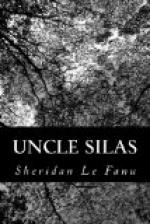‘Yes, sir.’
‘Your uncle Silas,’ he said, speaking suddenly in loud and fierce tones that sounded from so old a man almost terrible, ’lies under an intolerable slander. I don’t correspond with him; I don’t sympathise with him; I never quite did. He has grown religious, and that’s well; but there are things in which even religion should not bring a man to acquiesce; and from what I can learn, he, the person primarily affected—the cause, though the innocent cause—of this great calamity—bears it with an easy apathy which is mistaken, and liable easily to be mistaken, and such as no Ruthyn, under the circumstances, ought to exhibit. I told him what he ought to do, and offered to open my purse for the purpose; but he would not, or did not; indeed, he never took my advice; he followed his own, and a foul and dismal shoal he has drifted on. It is not for his sake—why should I?-that I have longed and laboured to remove the disgraceful slur under which his ill-fortune has thrown us. He troubles himself little about it, I believe—he’s meek, meeker than I. He cares less about his children than I about you, Maud; he is selfishly sunk in futurity—a feeble visionary. I am not so. I believe it to be a duty to take care of others beside myself. The character and influence of an ancient family is a peculiar heritage—sacred but destructible; and woe to him who either destroys or suffers it to perish!’
This was the longest speech I ever heard my father speak before or after. He abruptly resumed—
’Yes, we will, Maud—you and I—we’ll leave one proof on record, which, fairly read, will go far to convince the world.’
He looked round, but we were alone. The garden was nearly always solitary, and few visitors ever approached the house from that side.
’I have talked too long, I believe; we are children to the last. Leave me, Maud. I think I know you better than I did, and I am pleased with you. Go, child—I’ll sit here.’
If he had acquired new ideas of me, so had I of him from that interview. I had no idea till then how much passion still burned in that aged frame, nor how full of energy and fire that face, generally so stern and ashen, could appear. As I left him seated on the rustic chair, by the steps, the traces of that storm were still discernible on his features. His gathered brows, glowing eyes, and strangely hectic face, and the grim compression of his mouth, still showed the agitation which, somehow, in grey old age, shocks and alarms the young.
CHAPTER XX
AUSTIN RUTHYN SETS OUT ON HIS JOURNEY
The Rev. William Fairfield, Doctor Clay’s somewhat bald curate, a mild, thin man, with a high and thin nose, who was preparing me for confirmation, came next day; and when our catechetical conference was ended, and before lunch was announced, my father sent for him to the study, where he remained until the bell rang out its summons.




